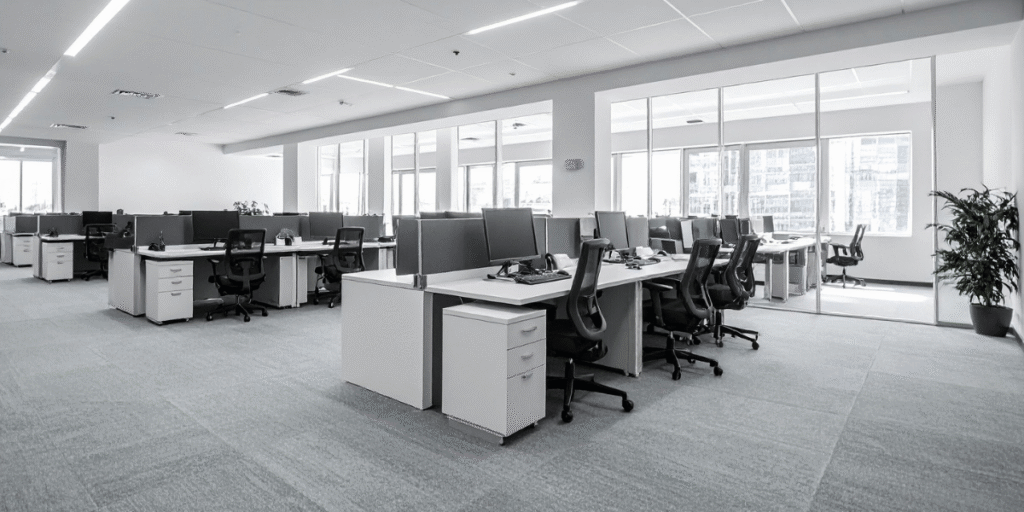What to Look for in a Biotech Building for Your Company

Choosing the right building for your biotech company isn’t just about square footage or proximity to major highways; it’s about finding a facility that supports innovation, safety, and growth. In a fast-evolving industry where breakthroughs in medicine and technology hinge on controlled environments, getting the space right could make or break your company’s success.
In fact, a survey by JLL Research reveals that 79% of biotech professionals consider location and infrastructure as critical factors influencing productivity and regulatory compliance. This article will explore the key features your company needs to prioritize when selecting a biotech facility.
Location and Accessibility
Proximity to research hubs is a top priority for biotech companies.
Being near universities, research institutions, and other biotech companies can foster collaborations that speed up innovation. According to a 2023 survey by CBRE, 68% of biotech executives cited access to talent and research partnerships as the top reasons for choosing their office location.
Additionally, consider accessibility for employees and supply chain logistics. Easy access to transportation hubs, such as airports and highways, can significantly reduce the costs and time involved in shipping supplies or products, especially for companies involved in clinical trials.
Understanding the zoning laws and regulatory environment is crucial. Some cities and regions have designated areas for biotech and pharmaceutical research, which simplifies compliance with local regulations. Always ensure your chosen building is in an area that supports biotech activities from a legal standpoint.
Laboratory Infrastructure
The heart of any biotech company is its laboratories.
A biotech facility must have high-quality laboratory infrastructure, starting with the ability to house sensitive equipment. This includes features like vibration control, essential for research involving microscopy or high-precision instruments.
A sturdy foundation, adequate ceiling height, and customizable lab layouts will ensure your facility can handle the necessary tools.
Additionally, consider the specialized utilities your biotech company will need. These include deionized water systems, high-capacity electrical power for equipment, and natural gas lines for research processes. Proper HVAC and air filtration systems are non-negotiable, as they are critical to maintaining a controlled environment for sensitive experiments and ensuring the safety of lab personnel.
Office and Collaboration Spaces
While labs are critical, biotech companies also need well-designed office spaces to foster collaboration and innovation. Open floor plans, flexible layouts, and designated collaboration areas can enhance teamwork between researchers, developers, and administrative staff.
In fact, a study published by Harvard Business Review found that open and collaborative workspaces increase innovation by 15% in research-intensive industries.
The inclusion of advanced technological infrastructure, such as high-speed internet, data storage systems, and integrated software platforms, is essential. This allows your company to keep up with the fast-paced nature of biotech research, where rapid access to data can give a competitive edge.
Safety and Compliance Features
Biotech facilities must meet stringent biosafety requirements, particularly for companies working with hazardous materials or live organisms. Compliance with Biosafety Level (BSL) regulations, whether BSL-2 or BSL-3, is essential for ensuring that experiments are conducted safely and that containment systems are in place.
According to the CDC, 21% of lab-associated infections can be traced to inadequate containment, underscoring the importance of safety features.
Also, facilities should have robust fire safety protocols, waste disposal systems, and proper storage for chemicals and biological materials. Certification from regulatory bodies like OSHA and environmental agencies will ensure your company avoids costly fines or operational shutdowns.
Future-Proofing and Scalability
Biotech is an industry that thrives on innovation and rapid growth. When choosing a facility, ensure it can accommodate your company’s future needs. Scalability is key.
The facility should offer flexible spaces that allow you to expand laboratory areas, add more offices, or even set up new production lines as your company grows.
Another important aspect is sustainability. Buildings with green certifications such as LEED can reduce operational costs while promoting environmental responsibility. According to the U.S. Green Building Council, LEED-certified buildings can reduce energy consumption by up to 25%, which is a significant benefit for energy-intensive biotech operations.
Cost Considerations
The biotech sector is capital-intensive, and facility costs are a significant part of that equation. A 2022 Deloitte survey found that 42% of biotech companies cite facility costs as one of their biggest challenges.
Beyond the upfront costs of acquiring or leasing a building, you’ll need to consider long-term operational expenses. These include energy consumption for running laboratories, maintenance costs for specialized infrastructure, and compliance-related expenditures.
It’s also worth investigating potential grants or incentives that local governments may offer to biotech companies. Some regions provide tax breaks or grants to biotech firms that bring jobs and research innovation to the area, which can make a big difference in your bottom line.
Security and Data Protection
In today’s biotech landscape, security extends beyond just keeping the building locked at night. With the rise of cyberattacks targeting intellectual property (IP), particularly in biotech where research data is invaluable, having robust cybersecurity protocols is crucial.
Access control systems that manage who can enter specific research labs, as well as secure storage solutions for data and samples, are fundamental.
A 2021 report by Accenture found that 44% of biotech companies faced cyberattacks in the past year, with many reporting losses of valuable IP. Investing in strong physical and digital security measures will help protect your company’s most valuable assets.
Additionally, a comprehensive video security system is essential for monitoring sensitive areas and safeguarding expensive equipment and proprietary materials. Modern systems equipped with video analytics can enhance security by detecting unusual activity and alerting security personnel in real time.
Regulatory and Compliance Support
Finally, regulatory compliance in the biotech sector is non-negotiable. Your facility should be designed to meet the requirements of agencies such as the FDA and the EPA. Ensuring the building is set up for regular audits and inspections will save time and reduce the stress of regulatory scrutiny. Many biotech firms prefer locations near legal and compliance support services that specialize in FDA regulations, ensuring faster responses and better preparation for audits.
Conclusion
Selecting the right building for your biotech company is a multi-faceted decision that extends beyond just finding space. From regulatory compliance to security, scalability, and infrastructure, every detail matters in an industry where precision is key.
By focusing on these critical aspects, your biotech company can secure a facility that not only meets today’s needs but also supports future growth and innovation.




